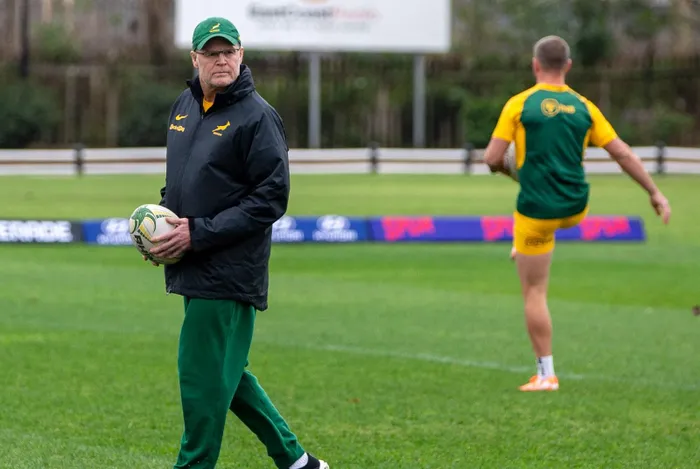Multi-headed Bok beast will be hard to slay at the World Cup in Australia
Rub of the Green

Springboks coach Rassie Erasmus has created a scary monster for opponents with his ever-expanding pool ot talent. | Leon Lestrade / Independent Newspapers
Image: Leon Lestrade / Independent Newspapers
In Greek mythology, the warrior Hercules was tasked with slaying the sea monster known as the Hydra. It was a mighty serpent with nine heads.
Hercules’ problem was that each time he chopped off a head, two more grew back in its place.
Opponents of the Springboks must feel the same frustration and hopelessness when they look at the multiple game plans the Boks have perfected, and the endless reservoir of talent Rassie Erasmus has unearthed.
Just as you get the hang of what the Springboks are about, they add another arrow or two to their tactical quiver, or just as a great player approaches the end of his career, a couple of Young Turks put their hands up.
Of course, the relentless evolution of the Boks under Rassie Erasmus is by design, not accident. And some of it — notably the constant rotation of the match-day squad has not always been popular.
A good example was the Test match against Wales in Bloemfontein in 2022. The Boks had won the previous week in Pretoria, and Erasmus made wholesale changes for Bloem. The revamped team battled to find any rhythm and lost 13-12, the first time Wales had won in South Africa.
There were howls of outrage from disappointed Bok fans, but debuts had been given to the likes of Kurt-Lee Arendse, Deon Fourie, Grant Williams, Ruan Nortje, Ntuthuko Mchunu, and Evan Roos. Some of those players are now senior Boks and World Cup winners.
The relentless mixing up of the team is not just about getting new talent up to speed and game time under their belts; it is also about prolonging the careers of the elder statesmen.
For instance, there is a greater chance of current 33-year-olds in Eben Etzebeth, Damian de Allende, and Pieter-Steph du Toit making it to Australia in 2027 if they don’t play all of the games, so their bodies can recover.
To the consternation of many, Etzebeth was rested for the match against the All Blacks in Wellington — how could the Boks go to war against the Old Foe without their toughest warrior? — but Erasmus trusts his squad. And what happened? The Boks put a record score past the New Zealanders.
After the last World Cup, Handre Pollard was walking on water after his goal-kicking heroics in France. It seemed inconceivable that a few seasons later, and at just 31 years of age, he would not make the squad. And it is not that Pollard is playing particularly badly. It is more about Sacha Feinberg-Mngomezulu and Manie Libbok playing better. The two took their chances when given a shot by Erasmus.
That is the joy of rotation — fresh players are given opportunities, and they know they have to make the most of them. Mostly, they do so.
In terms of tactics, this Springbok team has grown enormously since they won the 2019 World Cup as one-trick ponies. That trick was the box kick, which was allied to blitz defence and set-piece strangulation.
The current Boks can still play like that, and often do, but they can also do much more, as we are seeing with the impressive try counts in the Rugby Championship (this column was written before Saturday’s Test in London, and I’m hoping the Boks haven’t let me down!)
In fact, the Boks continue to kick more than any other tier one team, but because they score so many tries, the focus on kicking is disguised. To illustrate my point, the Durban match against the Pumas will be remembered for Feinberg Mngomezulu’s three excellent tries, not for the 15 times he kicked the ball.
In summary, the Springbok beast, much like the Hydra, continues to grow more “heads” the more it is provoked. That beast will take some slaying in Australia in two years.
Related Topics: